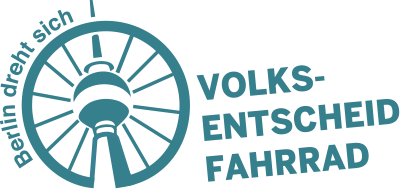Berlin, 21st November 2016. One year ago, the 21st of November 2015, a small group of Berliner bicycle activists started the initiative ‘Volksentscheid Fahrrad,’ Berlin’s Bicycle Referendum. Twelve months later, they have overhauled Berlin’s mobility and traffic politics. It took more than 2,100 days of voluntary work; some volunteers even invested more than 100 days, setting aside their jobs to make this happen.
The weekend of 20th and 21st of November 2015, 30 Berliner cycling enthusiasts came together for the first meeting. Everyone brought five goals that they would like to see realised to make Berlin bicycle friendly. From this initial long list of goals, 10 goals were formed during this meeting and the following days.
“Clearly formulated, with clear deadlines, and feasible – this is how hollow words become an urban transport agenda ready for implementation,” says Heinrich Strößenreuther, who organised the Berlin cycling scene in the early days and worked for over 200 days voluntarily. “Not even 12 months and our program is in the new coalition’s agreement. This shows that change can occur quickly and that politics can be fun. Berlin is rolling along.”
Since that weekend, 17,300 hours – equivalent to 2,100 days, or 11 years of work – were spent voluntarily. Some worked more than 100 days voluntarily, in part while working full-time jobs. A number of engaged participants has been involved since the beginning:
“For a while, the work was becoming very self-exploitative, but the strong team, the successes and the strong conviction in the common goal have unleashed an unbelievable energy,” remarked Peter Feldkamp, who put in 170 voluntary days.
“In the field of climate and traffic politics, it was long clear that the status quo is unsustainable. More than 100,000 Berliners made that clear in just three weeks. Now, Berlin has the great chance to be an example for other cities in Germany. For that result, every spent hour was worth it,” says Denis Petri, who spent the equivalent of 130 days preparing and coordinating the collection of signatures and worked as a city-guide alongside the project.
“’What are you doing tonight?’ ‘Sorry, the Bicycle Referendum…’ That’s been a typical question and response in the last twelve months. There was a lot of work and compromises had to be made. But that’s necessary in the democratic process, too. It is inspiring and great to be part of a movement that pushed Berlin to its mobility revolution”, says Kerstin Stark, who worked to shape the new cycling law for 105 days voluntarily – besides working on her doctoral thesis.
“An initiative like Berlin’s Bicycle Referendum was long overdue after decades of gridlock on our streets. I am sure, that our Berlin will win out in terms of life quality in the next few years, as a direct result of our cycling law,” elaborated Boris Hekele, who worked for 81 days in IT and formation of the formal association.
“It is this mix of fun, unbelievable professionality of really diverse group of people and the conviction, to finally end the chaos on Berlin’s streets. This is what makes this initiative so exciting and successful. The first year was thrilling and inspiring, but we have a long way to a real mobility change ahead,” adds Michael Schulte, who invested 81 days in establishing the association, dealing with bureaucracy, financial issues, and legalities.
“For me it was clear from the beginning of 2016 that I want to be a part of this movement and contribute what little I can to creating a better and more liveable future for Berlin. Since then I’m rewarded every day with the positive and very professional interactions and cooperation with the other volunteers. To actively contribute to a climate-friendly city is incredibly motivating,” said Hille Bekic, who put in 75 days coordinating the graphics team after her full-time job as a freelance architect.
“One year Volksentscheid Fahhrad, accompanied by a ground-breaking coalition agreement which promises to revolutionize mobility in Berlin, we could hardly celebrate our birthday in a better way. Not only that, but this highly time consuming work doesn’t only take energy and nerves, it’s also allowed me to really settle in Berlin, as someone who has moved here recently,” says Evan Vosberg, who spent 71 days working on the law and was on the board of the ADFC (the German Bicycle Club) next to his job.
“It’s good for Berlin that Bicycling and the mobility transition are finally receiving the recognition they deserve. The Netherlands and Copenhagen have been setting a good example for decades. If the mobility transition succeeds in Berlin, that will be signal, also for other German cities,” remarked Tim Birkholz, who contributed 71 days building contacts with the bicycle industry and worked in the social media team.
To achieve the final leg of the negotiations and implement the Bicycle Bill by spring 2017, the initiative has started a fundraising campaign. The goal is to fund three full-time positions for six months and pay for the rent on an office. For that, the initiative has to raise 100,000 Euros by the year’s end. Thus far, they’ve raised 19,000 Euros.
Further Links and Sources:
International Coverage of Volksentscheid Fahrrad
http://www.dw.com/en/berlin-mayor-rejects-new-cycling-law-despite-massive-co2-emissions/a-19294386
https://www.berlinjournal.biz/en/berlins-mayor-rejects-cycling-law/
http://www.copenhagenize.com/2016/04/berlin-decides-its-future.html
Information on Volksentscheid Fahrrad: https://volksentscheid-fahrrad.de/english/
Press releases online: https://volksentscheid-fahrrad.de/presse/pressemitteilungen/
Download this press release: https://volksentscheid-fahrrad.de/wp-content/uploads/2016/11/PM-One-Year-Berlin-Bicycle-Referendum-ENG.docx
Our presentation of the “Towards the New Urban Agenda statement” of 60 German scientists asking the Mayor of Berlin to act:
the New Urban Agenda Statement https://volksentscheid-fahrrad.de/wp-content/uploads/2016/05/160530-en-The-New-Urban-Agenda-Statement-fin.pdf,
the presentation https://volksentscheid-fahrrad.de/wp-content/uploads/2016/05/160530-en-presentation-New-Urban-Agenda-fin-1.pdf ,
and the Press release https://volksentscheid-fahrrad.de/2016/05/30/scientists-publicly-urge-berlin-mayor-michael-mueller-to-support-berlin-bicycle-referendum-1999/
Further pictures: https://www.picdrop.de/volksentscheidfahrrad/Presse
Contact Team Volksentscheid Fahrrad: Heinrich Strößenreuther, 0160 – 9744 2395, presse@volksentscheid-fahrrad.de
